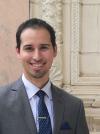Fellows 2015–2016
Senior Fellows and Postdoctoral Associates

Andrew Albin is assistant professor of English at Fordham College at Lincoln Center. He earned his Ph.D. in 2011 from Brandeis University and received a Licentiate in Medieval Studies from thePontifical Institute of Medieval Studies in 2013. His research in the emerging field of historical sound studies theorizes the sonorous past as an object of critical inquiry and pays heed to the embodied and material listening practices and aural experiences of late medieval hearers. Albin is also the librettist for three one-act operas and a song cycle, Songs of the Fisherman, performed internationally and released on DVD by Albany Records in 2012. During his fellowship year, he will complete critical commentary, translation, marginalia transcription, and musical recording of the fourteenth-century mystical treatise Melos amoris for a book to be published by the Pontifical Institute in 2017. The Melos amoris represents the most spirited expression of the sensory mysticism of Richard Rolle, among the most widely read English authors of the Middle Ages and a highly influential figure for the period’s spiritual practices. Composed in intensely alliterative Latin prose, the treatise has never been translated into English in its medieval or modern history, and its codicological and musical contexts have been entirely overlooked. The project thus advances Rolle’s most challenging literary work to the attention of scholars of medieval English spirituality, history, literature, music, and culture through a stylistically sensitive translation and a wealth of interdisciplinary and multimedia contexts.
 Michael Dodds is associate professor of Music History at the University of North Carolina School of the Arts and Director of Traditional Worship & Music at First Presbyterian Church of Winston Salem. Dodds completed his Ph.D. in musicology at the Eastman School of Music and his B.Mus. in violin performance at the Wheaton College Conservatory. His book project for the fellowship year, From Modes to Keys: The Organ in Baroque Liturgy, proposes a model clarifying the complex changes in how musicians conceptualized tonal space between the 16th and 18th centuries. In recent papers and articles, Dodds has explored topics including contexts and strategies for keyboard improvisation in Italian Office liturgy; transposition in Counter-Reformation vocal polyphony; the symbolism of musical canons in Seicento paintings; fugal procedures in Bach Passion choruses; implicit epistemologies in modal theory; and the mapping and navigation of tonal space in the Age of Discovery. International experiences have figured prominently in Dodds’ life: he grew up in the rainforest of Peru, worked for the U.N. in Vienna, and has conducted extensive research in Italy. Dodds is the recipient of numerous awards and fellowships, including Fulbright and NEH research fellowships and a UNCSA Excellence in Teaching Award. Dodds’ work as a composer is the subject of a forthcoming documentary, Blessed Unrest.
Michael Dodds is associate professor of Music History at the University of North Carolina School of the Arts and Director of Traditional Worship & Music at First Presbyterian Church of Winston Salem. Dodds completed his Ph.D. in musicology at the Eastman School of Music and his B.Mus. in violin performance at the Wheaton College Conservatory. His book project for the fellowship year, From Modes to Keys: The Organ in Baroque Liturgy, proposes a model clarifying the complex changes in how musicians conceptualized tonal space between the 16th and 18th centuries. In recent papers and articles, Dodds has explored topics including contexts and strategies for keyboard improvisation in Italian Office liturgy; transposition in Counter-Reformation vocal polyphony; the symbolism of musical canons in Seicento paintings; fugal procedures in Bach Passion choruses; implicit epistemologies in modal theory; and the mapping and navigation of tonal space in the Age of Discovery. International experiences have figured prominently in Dodds’ life: he grew up in the rainforest of Peru, worked for the U.N. in Vienna, and has conducted extensive research in Italy. Dodds is the recipient of numerous awards and fellowships, including Fulbright and NEH research fellowships and a UNCSA Excellence in Teaching Award. Dodds’ work as a composer is the subject of a forthcoming documentary, Blessed Unrest.
 Meredith Gamer received her Ph.D. in History of Art from Yale in 2015. Building on her dissertation, her project, “The Sheriff’s Picture Frame:” Art and Execution in Eighteenth-Century Britain, examines the relationship between the visual arts and rituals of public execution in this period. Drawing on a wide range of sources—from simple woodcuts to ambitious history paintings; aesthetic treatises to anatomical models—it exposes deep and complex links between the seemingly discrete spaces of the gallows and art academy. As a fellow at the ISM, she will research the role of Christian iconography, Anglican doctrine, and religious faith in the mediation of these links, and will revise the dissertation for publication as a book. Following her year at the ISM, she will join the faculty of Columbia University as assistant professor of art history.
Meredith Gamer received her Ph.D. in History of Art from Yale in 2015. Building on her dissertation, her project, “The Sheriff’s Picture Frame:” Art and Execution in Eighteenth-Century Britain, examines the relationship between the visual arts and rituals of public execution in this period. Drawing on a wide range of sources—from simple woodcuts to ambitious history paintings; aesthetic treatises to anatomical models—it exposes deep and complex links between the seemingly discrete spaces of the gallows and art academy. As a fellow at the ISM, she will research the role of Christian iconography, Anglican doctrine, and religious faith in the mediation of these links, and will revise the dissertation for publication as a book. Following her year at the ISM, she will join the faculty of Columbia University as assistant professor of art history.
 John A. Graham joins the Institute of Sacred Music at Yale University as a post-doctoral associate in 2015. He holds a Ph.D. in Musicology from Princeton University and a B.A. in Ethnomusicology from Wesleyan University. He studies liturgical repertories with a specialty in the polyphonic repertories of the early Latin Church and the Georgian Orthodox Church with secondary interests in the oral transmission of vocal repertories in sub-Saharan Africa, the Balkans, the Caucasus region, and the United States. Graham has published extensively on subjects related to Georgian Orthodox music, including issues of performance practice, oral and written transmission, and the post-Soviet revival of chant in contemporary Georgia, where he has spent many years conducting archival and fieldwork research. As a practitioner, Graham performs in the Kashweti Church Choir in Tbilisi, Georgia, is the founder/director of several amateur ensembles including the Princeton Georgian Choirs, and has curated workshops on Georgian chant in Finland, Rome, Paris, and the United States. Graham leads “MonasteryTours” in Georgia and Armenia annually, and has also brought several professional ensembles on tour to the United States including the critically acclaimed Anchiskhati Church Choir (2005), the Zedashe Folk Ensemble (2007), and the Sakhioba Ensemble (2012). In his current year at Yale ISM, he is working on several publications related to his dissertation research in the National Centre of Manuscripts in Tbilisi, Georgia.
John A. Graham joins the Institute of Sacred Music at Yale University as a post-doctoral associate in 2015. He holds a Ph.D. in Musicology from Princeton University and a B.A. in Ethnomusicology from Wesleyan University. He studies liturgical repertories with a specialty in the polyphonic repertories of the early Latin Church and the Georgian Orthodox Church with secondary interests in the oral transmission of vocal repertories in sub-Saharan Africa, the Balkans, the Caucasus region, and the United States. Graham has published extensively on subjects related to Georgian Orthodox music, including issues of performance practice, oral and written transmission, and the post-Soviet revival of chant in contemporary Georgia, where he has spent many years conducting archival and fieldwork research. As a practitioner, Graham performs in the Kashweti Church Choir in Tbilisi, Georgia, is the founder/director of several amateur ensembles including the Princeton Georgian Choirs, and has curated workshops on Georgian chant in Finland, Rome, Paris, and the United States. Graham leads “MonasteryTours” in Georgia and Armenia annually, and has also brought several professional ensembles on tour to the United States including the critically acclaimed Anchiskhati Church Choir (2005), the Zedashe Folk Ensemble (2007), and the Sakhioba Ensemble (2012). In his current year at Yale ISM, he is working on several publications related to his dissertation research in the National Centre of Manuscripts in Tbilisi, Georgia.
 Eben Graves earned a Ph.D. in Ethnomusicology at the University of Texas at Austin with a dissertation studying padāvalī-kīrtan, a genre of Hindu devotional song from eastern India. He has previously taught courses on ethnomusicology and popular music at Southwestern University and the University of Texas at Austin. As a postdoctoral fellow at Yale, he will complete a manuscript entitled Sacred Songs in Musical Markets: Religious Aesthetics, Temporal Organization, and Padāvalī-Kīrtan in West Bengal. This book project combines historical, ethnographic, and performance-based perspectives to analyze the way that musical time is more broadly related to principles of temporal organization in devotional religious practice in Bengal, and how shifts in social order, patronage, and commercialization over the past century have affected padāvalī-kīrtan’s long-duration musical style. The book is based on research that spans thirteen years of studying musical performance in India.
Eben Graves earned a Ph.D. in Ethnomusicology at the University of Texas at Austin with a dissertation studying padāvalī-kīrtan, a genre of Hindu devotional song from eastern India. He has previously taught courses on ethnomusicology and popular music at Southwestern University and the University of Texas at Austin. As a postdoctoral fellow at Yale, he will complete a manuscript entitled Sacred Songs in Musical Markets: Religious Aesthetics, Temporal Organization, and Padāvalī-Kīrtan in West Bengal. This book project combines historical, ethnographic, and performance-based perspectives to analyze the way that musical time is more broadly related to principles of temporal organization in devotional religious practice in Bengal, and how shifts in social order, patronage, and commercialization over the past century have affected padāvalī-kīrtan’s long-duration musical style. The book is based on research that spans thirteen years of studying musical performance in India.

Tala Jarjour is assistant professor of music at the University of Notre Dame, with a concurrent appointment in the department of anthropology. She is also a fellow of the Krock Institute for Peace Studies, the Kellogg Institute for International Studies, and the Medieval Institute. Her project on Syriac chant in Aleppo, entitledEdessan Chant and the Musical Aesthetics of Emotion, is an ethnomusicological book on an oral early Christian tradition. The book studies the sacred music of one of the war-ravaged historic city’s most vulnerable religious communities, underlining in the process the significance of chant to a disempowered ethno-religious minority.
 Claire Pamment is a performance practitioner and scholar, who works in South Asian theater and popular performance. She is assistant professor at the Department of Media Studies, Kinnaird College, Lahore and former head of the Department of Theatre at National College of Arts, Rawalpindi. Her Ph.D. thesis from Royal Central School of Speech and Drama explored comic performance in Pakistan with a focus on the bhānd tradition through Sufi wise fools, and transformations in contemporary culture. Over the last two years, with the support of a Canadian Social Sciences and Humanities Research Council grant, she has been working on the performance culture of the Pakistani transgender community of khwaja saras (hijras). During her fellowship at Yale she will further this research by investigating how Sufism informs khwaja sara identity and history in Pakistan, and shapes performance practices that enable this transgender community to negotiate a variety of restrictive social scripts.
Claire Pamment is a performance practitioner and scholar, who works in South Asian theater and popular performance. She is assistant professor at the Department of Media Studies, Kinnaird College, Lahore and former head of the Department of Theatre at National College of Arts, Rawalpindi. Her Ph.D. thesis from Royal Central School of Speech and Drama explored comic performance in Pakistan with a focus on the bhānd tradition through Sufi wise fools, and transformations in contemporary culture. Over the last two years, with the support of a Canadian Social Sciences and Humanities Research Council grant, she has been working on the performance culture of the Pakistani transgender community of khwaja saras (hijras). During her fellowship at Yale she will further this research by investigating how Sufism informs khwaja sara identity and history in Pakistan, and shapes performance practices that enable this transgender community to negotiate a variety of restrictive social scripts.
 Hugo Mendez completed his Ph.D. at the University of Georgia, exploring the poetry of the infancy hymns of the gospel of Luke. He also holds a master’s degree in religion. His publications include articles, printed or forthcoming, in the Journal of Biblical Literature, Vigiliae Christianae, and New Testament Studies. In his current postdoctoral fellowship at Yale, he is completing a monograph exploring the reception and cult of Stephen the martyr (Acts 6-8) in late antique Jerusalem, with special attention to the function of Stephen in local anti-Jewish rhetoric.
Hugo Mendez completed his Ph.D. at the University of Georgia, exploring the poetry of the infancy hymns of the gospel of Luke. He also holds a master’s degree in religion. His publications include articles, printed or forthcoming, in the Journal of Biblical Literature, Vigiliae Christianae, and New Testament Studies. In his current postdoctoral fellowship at Yale, he is completing a monograph exploring the reception and cult of Stephen the martyr (Acts 6-8) in late antique Jerusalem, with special attention to the function of Stephen in local anti-Jewish rhetoric.